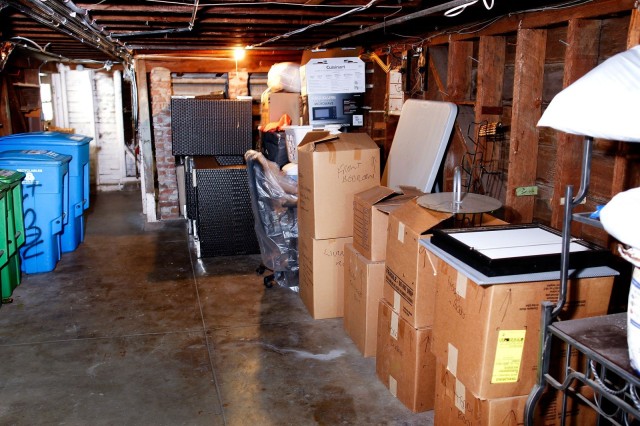SAN FRANCISCO — The latest innovation of the so-called sharing economy seems perfect for this city’s hypercompetitive rental market, where tiny apartments go for outrageous sums and space is at a premium.
Sort of like Airbnb for storage, new startup Roost connects people who need to stow some stuff — furniture, boxes of books, whatever — with individuals with room to spare in an attic or garage.
The company was founded by Jon Gillon, who came up with the idea after his older brother moved here from Texas with a Subaru full of stuff.
“We improvised,” Gillon told Cult of Mac. “I made room in my apartment in exchange for drinks and dinner. When his place was ready we were like, ‘This is a great idea.’ The light bulb went on.”
Americans just might be the world’s biggest packrats. Every year, we spend $24 billion to store the stuff that tumbles out of the two-car garages and attics of our home sweet homes, according to the Self Storage Association. We’re so obsessed with the stuff we collect that trash-to-treasure television shows like Storage Wars and American Pickers have become must-see reality TV for certain segments of the population.
Gillon, co-founder and CEO of Roost, figures he makes a pretty good test case for his company’s new service, which makes it easy for individuals to rent out spare space in their homes. We met up in San Francisco’s Inner Richmond neighborhood, where his outdoor rattan couch and chair are stacked in Heddi Cundle‘s dimly lit, exposed-brick basement thanks to a Roost agreement.
Gillon, who has lived in San Francisco for two years, recently moved into smaller digs in Russian Hill. His landlord brayed at the couch on the rooftop common area, so Gillon was faced with a decision that most of us hate: Sell his belongings? Or store them somewhere? He found a buyer who was moving to the neighborhood and wanted some outdoor furniture, so he just needed to stash his stuff for a few weeks.

To store his couch, Gillon pays $300 a month for roughly 10 feet by 10 feet of storage. Roost means less red tape than if he rented a traditional storage unit, plus no hidden fees or minimum lease times. Plus, in his case, there’s “access to a cute dog,” he says, petting Muppet Bundle, Cundle’s black spaniel.
Roost’s business model (and competitors)
Roost’s hosts decide what they are willing to store and how much access they want to grant to the renters. The startup takes a 12 percent fee from each transaction, and the payment processor takes another 3 percent. Roost’s six-member team, with offices in the Financial District, is also working on revenue-share agreements with complementary services like moving, hauling and furniture consignment. The company currently has a nest egg of about $300,000, the bulk of it from Stephen Roulac of Roulac Global and John Sicilian of 1848 Capital.
The fledgling enterprise isn’t the only local startup out to break into the storage industry in a city characterized by the frenzied comings and goings of would-be entrepreneurs. There’s also BoxBee, which provides bins for your belongings, picks them up and stores them for you at competitive prices (about $150 a month to store 20 boxes of stuff). If your belongings are more substantial, there’s ZipCube, which sends over metal containers large enough to house up to one bedroom worth of furniture each, for prices ranging from $49 to $79 a month depending on the length of the lease (plus startup fees).
Gillon is an old hand at the sharing economy. He has worked in San Francisco as a Tasker for TaskRabbit, eventually specializing in assembling furniture.
“I’m a whiz at Ikea assembly,” he says. “There are some models I don’t even need the directions to put together.” And because he and his friends moved frequently, he became a kind of a “Tetris master” at loading his gear into and on top of his Hyundai Sonata.
Roost plays up the social aspect of the peer-to-peer rentals it enables, and the apple-cheeked Gillon makes a good poster boy for it — he brought a bouquet of flowers for Cundle along with his couch.
“I haven’t had flowers in years,” Cundle says. “I’m so absolutely non-girly girly about that stuff, I couldn’t believe it.”
After having good experiences with other peer companies like TaskRabbit and car-sharing service Get Around, she signed up as a host when Roost hung a flyer on her front door. The platform has about 200 registered hosts in San Francisco so far.
Still, there are plenty of instances where someone might want to store stuff you wouldn’t want in your house: Think stolen goods (a la the novel The Goldfinch) or maybe a Xerox machine used to copy filched FBI documents (true story, as in The Burglary.) Or even a feuding couple in the throes of a breakup, stashing items they don’t want the other one to grab.
“I see scenarios like that happening very little to never,” Gillon says, adding that renters sign up with credit cards, social network profiles and mobile phones. In the event that something goes awry on the host’s end, Roost offers renters a guarantee of up to $10,000 to cover damage to their belongings.
The sharing economy’s cruise into the mainstream isn’t without its speed bumps, though. Given the ongoing battle between taxi operators and ride-share services like Uber and Lyft — and the recent local backlash against sharing apps like MonkeyParking — Roost isn’t taking any chances. The startup is repped by Pillsbury Winthrop Shaw Pittman, a law firm whose antecedents stretch back almost to California’s original gold rush.
“When we start disrupting, I’m sure there’ll be pushback. We’re expecting it,” Gillon says, adding that the shove will most likely come from established real estate and storage-rental companies. “Everyone in the sharing economy expects it — it’s part of the package.”



